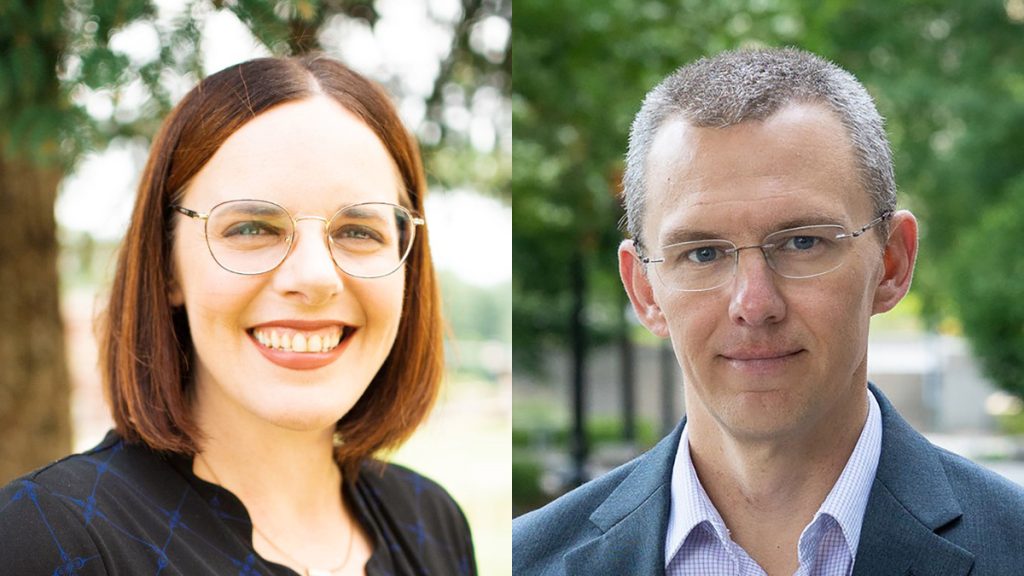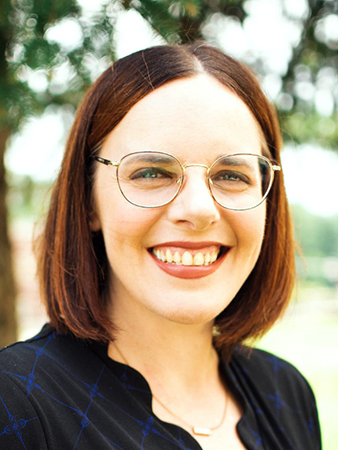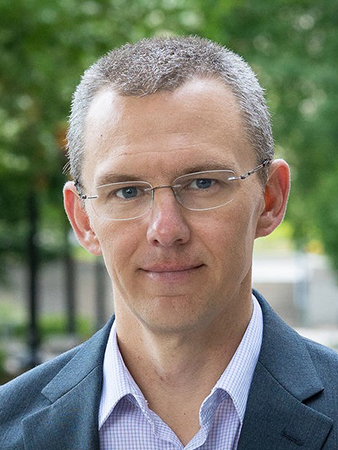
Two new researchers to lead impact-driven research at Missouri School of Journalism’s Reynolds Journalism Institute
The Missouri School of Journalism is set to welcome two new research faculty and alums who will work with the Donald W. Reynolds Journalism Institute (RJI) to translate academic work into direct benefits for newsrooms around the country. Joy Jenkins and Nick Mathews will arrive at the School in the fall as assistant professors of media sociology, bringing varied but collaborative approaches to analyzing and supporting the local news industry.
Jenkins and Mathews aim to build a research team that will bridge the gap between research and industry, working with journalists and scholars alike to create lasting impacts that address challenges related to technology, funding, audience engagement and others faced by local news organizations.
“To bring local news back to news deserts and help community-centered journalism thrive, research has to be about more than theory,” said Randy Picht, executive director of RJI. “Joy and Nick will complement and expand our efforts to bring solutions directly into newsrooms — efforts that include hands-on research from faculty as well as graduate and undergraduate journalism students — all of which is aimed at creating real benefits in newsrooms.”
Meet the researchers

Jenkins, who earned a doctorate from the School of Journalism in 2017, returns to her alma mater after stints at the Reuters Institute for the Study of Journalism at the University of Oxford and at the University of Tennessee. She brings an international perspective to the study of shifts in the local news environment, such as organizations’ efforts to manage transitions toward increasingly digital products and resources.
“It’s a way to look at ideas that are emerging here in the U.S. and see how those manifest in other countries,” Jenkins said from an apartment in Spain, where she is currently leading a study abroad program during her final semester at Tennessee. “What works and what doesn’t? Are there things we can try here, and what would that look like?”
Yet this broad perspective serves only to deepen Jenkins’ focus on developing solutions of use to the local news industry in the U.S., which, despite growing recognition of its value as a trusted news source amid historically low rates of public trust in media, remains threatened, evident in the continuing spread of news deserts.
“It’s really leveraging the fact that we have these local working newsrooms right there at Mizzou and figuring out how we can use those as labs to test new ideas and see what works,” Jenkins said. “Then we can take that to other newsrooms around the state and even beyond. At the same time, we want to make connections with rural newsrooms and other news organizations around Missouri to understand what they need and how we could help.”

Mathews’ work, too, is focused squarely on local news, though much of his research centers specifically around the impact of news deserts on audiences and their communities. He is interested in understanding how a lack of access to information and news affects people both at the individual level and as a society.
“We understand the significance of news organizations when it comes to the democratic and civic engagement within a community, but I tend to look a little beyond that,” Mathews said. “There are relationship-building aspects that a news organization helps promote. Bringing people together, helping community members really celebrate their community. Those are the things I focus on.”
Already a prolific researcher just one year removed from his doctorate (he earned his bachelor’s and master’s degrees from the School of Journalism and his doctorate from the University of Minnesota), Mathews see his role as a guardian of sorts for local news: a champion for the value and impact of rural and community-centered news, but one who won’t shy away from expressing criticism where it is due. Like Jenkins, Mathews expects to thrive on work with RJI that goes beyond theory into experimentation and strategy developed in concert with the very industry his research supports.
“My work is very practical in nature — I’m trying to find and shine a light on best practices for local news organizations to serve their audiences better,” Mathews said. “Joy and I, along with the Reynolds Journalism Institute, want to both celebrate best practices and highlight some ways that these news organizations can really make a difference going forward.”
The duo will join researchers like Damon Kiesow and Shuhua Zhou, who, with support from RJI, are currently engaged in an ongoing, multi-level study of how audiences process different types of news. That work will help news organizations optimize engagement through layout design and other considerations, and many others at the School and RJI are producing translatable research and forging industry partnerships.
But RJI and the School of Journalism aren’t content to simply reduce the lag time between advances in academic research and corresponding benefits felt by the industry. For Earnest Perry, associate dean for graduate studies and research, the goal is for that line to be erased – for research to become an integral cog in the machine of news production.
“Joy and Nick’s research is directly connected to the way journalism is produced,” Perry said. “Newsroom structure, culture, the content produced and how that content connects with communities is all part of the broader impacts that this kind of research creates. With their addition to our research faculty, we continue to strengthen our ability to take research and put it into the field.”
To that end, Jenkins and Mathews will serve as leaders in an impact-oriented culture at RJI and the School of Journalism that includes projects like the Potter Digital Ambassadors Program, which sends journalism students to rural news outlets armed with strategic and technological solutions, and the Mississippi River Basin Ag and Water Desk, which conducts and distributes rigorous environmental reporting to news outlets free of charge.
Both Jenkins and Mathews agree that the stage is set for an eventful fall, when they will arrive at Mizzou and begin to put their plans into action.
“Having a research institute that is so engaged with industry, and having the space, time and resources to make the most of that engagement is a massive advantage,” Jenkins said.

Comments